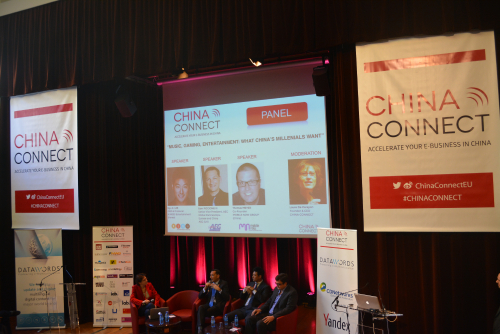|
 |
|
TIME TO SHARE: Panelists talk about the characteristics of Chinese customers at the 2015 China Connect conference in Paris on March 5 (ZHOU XIAOYAN) |
Over the past three to four years, American cosmetics brand Estée Lauder has quickly ascended to the position of a top beauty brand in the world, and the company's secret lies in its wise investment in the world's most promising consumer market--China.
"We became the No.1 beauty brand in the world in department stores, ahead of Shiseido and Lancome, because of the investment we made in China, especially in terms of digital marketing and e-commerce," said Pierre Abadie Lacourtoisie, Asia Pacific Regional Director of Digital Marketing and E-commerce at Estée Lauder, during a panel discussion at the 2015 China Connect conference.
Lacourtoisie attributed Estée Lauder's success first and foremost to its good quality and then to the company's deep understanding of its Chinese customer base.
"Estée Lauder has been conducting different studies to help us understand what Chinese consumers want. First, they don't want the products to be forced down their throats. They want some tips so that they can create their own experience," he said. "Also, marketing is very digital in China. Customers trust what their friends and relatives are saying and value other users' feedbacks very much. So we have created a platform where people are invited to try our products and write reviews."
As an economic heavyweight, China is quickly realizing its role in the global consumer market. Lacourtoisie is one of the 300 attendees who are extremely keen on the landscape of Chinese customers at the China Connect conference. Founded by Laure de Carayon in 2011, China Connect is the largest European gathering of experts specializing in Chinese consumer trends, digital and mobile strategies. This unique event reaches out to an audience of top-level European marketing and digital decision-makers focusing on the Chinese market. This year's conference was held from March 5-6 in Paris, France. During the event, attendees shared their perspectives on marketing, branding and mobile challenges in a market that holds both promise and challenge.
Analyzing the target
"Many people are talking about China, but the reality is we should talk about what's going on with the Chinese," said Erwan Rambourg, an analyst with HSBC and the author of The Bling Dynasty, a book on the growing Chinese influence on luxury sales.
Linda Tan, Strategic Insights Director of media agency ZenithOptimedia, said it's increasingly important to understand China's millennials, as they account for an increasing proportion of consumption. She defines millennials as those who reached adulthood at the beginning of the millennium, therefore people born between 1982 and 1994.
According to Tan, China's millennials have several characteristics: They tend to structure their life around happiness, always think about how to make the best use of their potential, approach work in a novel way, pursue meaningful experiences and build their life around social media.
"A clear distinction between China's millennials and those in other countries lies in their attitude toward work," Tan told Beijing Review. "Chinese millennials are more focused on work and adopt a more practical attitude toward it by perceiving it as a way to improve the quality of their life. Their work is the fullest expression of their identity while, in other countries, there are many other ways to express self-identity, such as fashion, hobbies and interests."
"Marketing in China should factor in this difference, through measures such as making the consumer journey effortless so as to help customers make purchasing decisions faster and help them maintain a better balance between life and work. Another way is to help them improve their career, say, even when you are trying to sell laundry detergent, you should appeal to its higher purpose, such as making customers look more professional at work, instead of emphasizing its functionality in cleaning."
Brands need to have purpose in Chinese customers' lives. If you want to sell cameras, you should advertise that the cameras can be used to record beautiful memories in people's lives, she said. "Also, brands should facilitate the sharing of experiences among customers."
Lacourtoisie of Estée Lauder offers some advice on occasion-based branding for Western brands eyeing the Chinese market.
"Occasion branding is important because it has a high marketing response rate and a high engagement rate on social media in China. An occasion is more than a festival. It is a specific moment and requires specific timing for a specific group," he said.
"The first thing for global brands aiming at the Chinese market is to mark your Chinese calendar," he suggested.
According to him, in China, major occasions include the Chinese Lunar New Year, Chinese Valentine's Day (the seventh day of the seventh lunar month), Singles' Day (an annual online shopping festival that falls on November 11), wedding days, overseas trips and "me time" (a period of time in which each woman slows down to focus on herself by being pampered and relaxing).
| 